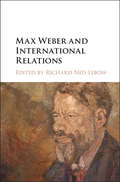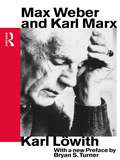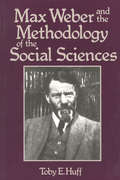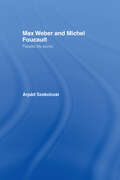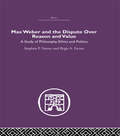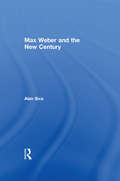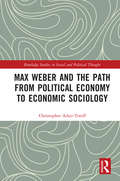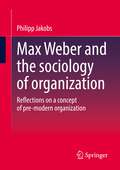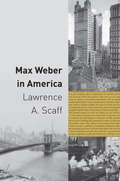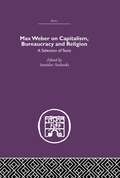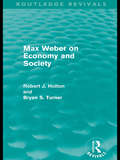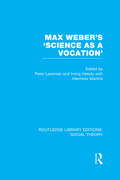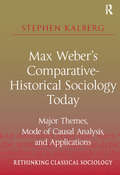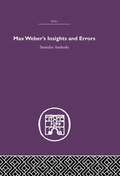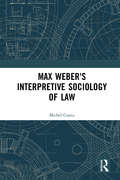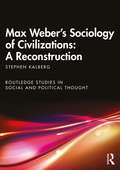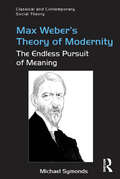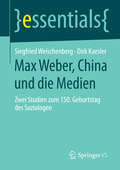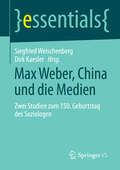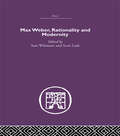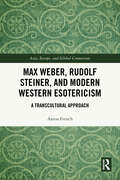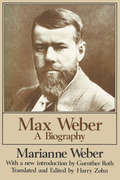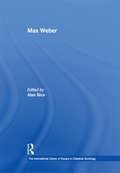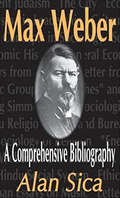- Table View
- List View
Max Weber and International Relations
by Lebow Richard NedMax Weber explored the political, epistemological and ethical problems of modernity, and understood how closely connected they were. His efforts are imaginative, sophisticated, even inspiring, but also flawed. Weber's epistemological successes and failures highlight unresolvable tensions that are just as pronounced today and from which we have much to learn. This edited collection of essays offers novel readings of Weber's politics, approach to knowledge, rationality, counterfactuals, ideal types, power, bureaucracy, the state, history, and the non-Western world. The conclusions look at how some of his prominent successors have addressed or finessed the tensions of the epistemological between subjective values and subjective knowledge; the sociological between social rationalization and irrational myths; the personal among conflicting values; the political between the kinds of leaders democracies select and the national tasks that should be performed; and the tragic between human conscience and worldly affairs.
Max Weber and Karl Marx (Routledge Classics in Sociology)
by Karl LowithFirst Published in 2004. Routledge is an imprint of Taylor & Francis, an informa company.
Max Weber and Methodology of Social Science
by T. HuffHuff provides a rare, full-scale study of the origins and development of Max Weber's methodology, which focuses on Weber's neglected early methodological essays that were not translated into English until the 1970s. He explores Weber's writings in light of developments in postempiricist philosophy of science, and shows that Weber was well aware of the epistemological foundations of the descriptive psychology school, whose intellectual heir was Husserl. This volume will help scholars and students understand in the broadest sense the issues central to the logic of social scientifi c explanation, and will appeal to philosophers, sociologists, political scientists, as well as scholars of Weber.
Max Weber and Michel Foucault: Parallel Life-Works (Routledge Studies in Social and Political Thought)
by Arpad SzakolczaiMax Weber and Michael Foucault are among the most controversial and fascinating thinkers of our century. This book is the first to jointly analyse them in detail, and to make effective links between their lives and work; it coincides with a substantial resurgence of interest in their writings. The author's exciting interpretative approach reveals a new dimension in reading the work of Foucault and Weber; it will be invaluable to students and those researching in sociology and philosophy.
Max Weber and the Dispute over Reason and Value: A Study Of Philosophy, Ethics And Politics (International Library Of Sociology Ser.)
by Stephen P. Turner Regis A. FactorThe problem of the nature of values and the relation between values and rationality is one of the defining issues of twentieth-century thought and Max Weber was one of the defining figures in the debate. In this book, Turner and Factor consider the development of the dispute over Max Weber's contribution to this discourse, by showing how Weber's views have been used, revised and adapted in new contexts. The story of the dispute is itself fascinating, for it cuts across the major political and intellectual currents of the twentieth century, from positivism, pragmatism and value-free social science, through the philosophy of Jaspers and Heidegger, to Critical Theory and the revival of Natural Right and Natural Law. As Weber's ideas were imported to Britain and America, they found new formulations and new adherents and critics and became absorbed into different traditions and new issues. This book was first published in 1984.
Max Weber and the New Century
by Alan Sica"The most profound and enduring social theorist of sociology's classical period, Max Weber speaks as cogently to concerns of the new century as he did to those of the past. Over the past seventy years, those special ideas that have become identified as ""Weberian"" have become especially pertinent to those who would analyze today's socioeconomic and cultural life. They offer the possibility of a more acute understanding of our immediate future than reliance on the ideas of any other social theorist in the pantheon. Alan Sica demonstrates Weber's preeminent position and lasting vitality within social theory by applying them to topics of contemporary concern. The result will appeal to experts and novices alike.Max Weber and the New Century documents the continuing usefulness of Weber's unrivalled social thought. Sica offers a series of linked studies that treat Weber's concept of rationalization as expressed in different cultural forms, the role of Weberian ideas in contemporary historiography, the uses of Weber's image in the popular imagination, the rhetorical structure of Economy and Society, and Weber's relationship to modern philosophical thought. Conceptually and practically, this volume is a companion piece to the author's forthcoming Max Weber: A Comprehensive Bibliography--a 3,600-item bibliography of works by and about Weber in English--which, for the first time, will allow scholars to explore the universe of Weberian analysis.Max Weber and the New Century is a valuable addition to the library of social scientists, historians, philosophers, economists, and students of intellectual history. It shows that Weber--the scholar as much as his ideas--continues to inspire fruitful social and cultural analyses."
Max Weber and the Path from Political Economy to Economic Sociology (Routledge Studies in Social and Political Thought)
by Christopher Adair-ToteffThis book examines the largely-neglected shift in Max Weber’s work from political economy to economic sociology. Considering the importance of his recognition—made during his research on the Protestant Ethic—of the reciprocal influences that exist between economics and society and the role of this realization in prompting him to rethink the study of political economy, the author sheds fresh light on his emerging belief that the study of the relationship between economic factors and social issues required a new discipline. A study that charts an important development in the thought of one of the founding figures of sociology, this volume will appeal to scholars of social theory with interests in the history of the field and the legacy of Max Weber.
Max Weber and the sociology of organization: Reflections on a concept of pre-modern organization
by Philipp JakobsIn today's organizational sociology, organizations are usually regarded as late achievements of modernity in the history of mankind. Max Weber is repeatedly cited as the supposed guarantor of this thesis. But neither his type of "bureaucratic rule" nor his concept of "rational work organization" - although both are tailored to modern conditions - contain, on closer inspection, compelling arguments for a principled limitation of organizations as such to modernity. Both actually reach their depth of focus only in contrast to "pre-modern" forms of organization. A sociology of organization that wants to refer to Max Weber's work while avoiding the numerous common misunderstandings of its reception must broaden its historical view and consider the possibility of "pre-modern organizations".
Max Weber in America
by Lawrence A. ScaffMax Weber, widely considered a founder of sociology and the modern social sciences, visited the United States in 1904 with his wife Marianne. The trip was a turning point in Weber's life and it played a pivotal role in shaping his ideas, yet until now virtually our only source of information about the trip was Marianne Weber's faithful but not always reliable 1926 biography of her husband.Max Weber in America carefully reconstructs this important episode in Weber's career, and shows how the subsequent critical reception of Weber's work was as American a story as the trip itself. Lawrence Scaff provides new details about Weber's visit to the United States--what he did, what he saw, whom he met and why, and how these experiences profoundly influenced Weber's thought on immigration, capitalism, science and culture, Romanticism, race, diversity, Protestantism, and modernity. Scaff traces Weber's impact on the development of the social sciences in the United States following his death in 1920, examining how Weber's ideas were interpreted, translated, and disseminated by American scholars such as Talcott Parsons and Frank Knight, and how the Weberian canon, codified in America, was reintroduced into Europe after World War II. A landmark work by a leading Weber scholar, Max Weber in America will fundamentally transform our understanding of this influential thinker and his place in the history of sociology and the social sciences.
Max Weber on Capitalism, Bureaucracy and Religion
by Stanislav AndreskiFor this important selection from Weber, sections of text from Weber's major works (Gesammelte, Aufsatze Zur Religionssoziologie, including The Protestant Ethic and the Spirit of Capitalism; General Economic History; and The Agrarian Sociology of Ancient Civilisations) have been carefully edited and substantially translated to form a coherent and integrated volume. Professor Andreski's aim has been to use Weber's own works to explain crucial turns in the evolution of societies and cultures, while eliminating the difficulties of language and frequent mistranslation which have previously made Weber so difficult and baffling for students new to his work. An essay by Andreski introduces the selections, which are centred on Weber's principal interest, the relationship between capitalism, religion and bureaucracy. He seeks to correct those misinterpretations of Weber's work which have stressed his classification, rather than his attempts to theorise and explain social phenomena on the basis of a comparitive analysis of universal historical trends. This book was first published in 1983.
Max Weber on Economy and Society (Routledge Revivals)
by Bryan S. Turner Robert HoltonFirst published in 1989, this re-issue concerns itself with the relevance of Max Weber's sociology for the understanding of modern times. The book outlines key tenets of Weber's sociology and points to the valuable legacy of Weber's thought in contemporary intellectual debate, particularly with regard to secularization and rationalization of global cultures, the crisis of Marxism, the rise of the New Right and the emergence of post-modernism. This book offers an authoritative and insightful study which brings to light, not only the contemporary relevance of Weber's social theory, but also offering a broad perspective for the analysis of social questions.
Max Weber und die Organisationssoziologie: Überlegungen zu einem Begriff der vormodernen Organisation (Organisationsstudien)
by Philipp JakobsOrganisationen gelten in der heutigen Organisationssoziologie meist als menschheitsgeschichtlich späte Errungenschaften der Moderne. Als vermeintlicher Gewährsmann dieser These wird immer wieder Max Weber angeführt. Doch weder dessen Typus „bürokratischer Herrschaft“ noch dessen Begriff der „rationalen Arbeitsorganisation“ – obgleich beide auf moderne Verhältnisse zugeschnitten sind – enthalten bei näherem Hinsehen zwingende Argumente für eine prinzipielle Begrenzung von Organisationen als solchen auf Moderne. Beide erreichen eigentlich erst im Kontrast zu „vormodernen“ Organisationsformen ihre Tiefenschärfe. Eine Organisationssoziologie, die sich unter Vermeidung der zahlreichen gängigen Missverständnisse der Rezeption auf Max Webers Werk berufen will, muss ihren historischen Blick weiten und die Möglichkeit „vormoderner Organisationen“ in Betracht ziehen.
Max Weber's 'Science as a Vocation'
by Peter Lassman Irving Velody Herminio MartinsMax Weber’s lecture ‘Science as a Vocation’ is a classic of social thought, in which central questions are posed about the nature of social and political thought and action. The lecture has often taken to be a summation of Weber’s thought. It can also be argued that, together with the responses of its admirers and critics, it provides a focus for discussion of the nature of modernity and its political consequences, and of the philosophical and political implications of the social or human sciences. This volume provides a full, clear, revised translation of the lecture, together with translations from the German of key contributions to the lively debate that followed its publication. The book concludes with a substantial essay on the current significance of the lecture, which discusses its relevance to the debates about the nature of science as a cultural phenomenon; the disjunction between science and nature; Weber’s conception of the disenchantment of the world; the division of scientific labour; and the fundamental nature and place of sociology.
Max Weber's Comparative-Historical Sociology Today: Major Themes, Mode of Causal Analysis, and Applications (Rethinking Classical Sociology)
by Stephen KalbergBringing together the author's major scholarly work on Weber over the last thirty years, Max Weber's Comparative-Historical Sociology Today addresses major themes in Weber's thought, whilst also examining the mode of analysis practised in his comparative-historical writings. By exploring Weber's concepts and procedures, the individual chapters seek to convey the rigor of his research strategies, demonstrating their uniqueness. In this light, this study proceeds to identify as incomplete and then reconstruct the analyses undertaken by Weber of the rise of Confucianism in China, the caste system in India, and monotheism in ancient Israel. The analysis then advances to the modern era, utilising Weber's research procedures to explain the origins of four independent phenomena: the singularity of the American political culture, the cultural foundations of modern citizenship, cultural pessimism (Kulturpessimismus) in nineteenth century Germany, and the 'location' of work in contemporary German society. A dialogue with a variety of recent major schools is pursued throughout this volume. Offering a rich examination of the major themes in Weber's sociology, alongside a reconstruction of his mode of analysis and application of his approach, this book will appeal to scholars around the world with interests in social theory, German and American societies, cultural sociology, political sociology, the sociology of knowledge, comparative-historical sociology, and the sociology of civilizations.
Max Weber's Insights and Errors (International Library Of Society Ser.)
by Stanislav AndreskiMax Weber (1864-1920) is generally recognised as one of the founding fathers of modern sociology. His ideas continue to be discussed by sociologists and historians and much homage is paid to his contribution to knowledge. However, such is the awe which the breadth of his knowledge inspires that most general books about Weber contain summaries rather than criticism. This book is the first attempt to evaluate Weber's entire work in the light of historical knowledge available today and of contemporary analytic philosophy. Professor Andreski shows where Weber's true greatness lies, which of Weber's ideas are still valid, which need either correction or modification and which merit rejection. Andreski places Weber in his social and cultural context of the intellectual preeminence of German culture in the second half of the nineteenth century. He examines Weber's most famous theses on objectivity, methodological individualism, ethical neutrality; explanation versus understanding; ideal types; rationalisation; bureaucracy, charisma, power, law and religion; as well as the explanation of the rise of capitalism and uniqueness of Western civilization. Andreski concludes by considering what contemporary scholars should learn from Weber if they want to advance further. He argues that the most important lesson is that comparative study of history (including recent history) is the only method of giving empirical support to an examination of large-scale social processes or a general proposition about them. This book was first published in 1984.
Max Weber's Interpretive Sociology of Law
by Michel CoutuThis book presents a clear and precise account of the structure and content of Max Weber's sociology of law: situating its methodological and epistemological specificity in relation to other approaches to the sociology of law; as well as offering a critical evaluation of Weber's usefulness for contemporary socio-legal research. The book is divided into three parts. The first part deals with the methodological foundations of Weber's sociology of law. The second analyses the central theme of this sociology, the rationalisation of law, from the perspective of its internal logical coherence, its empirical validity, and finally its legitimacy. The third part questions the present-day relevance of the Weberian sociology of law for socio-legal research, notably with regard to legal pluralism. Max Weber, it is demonstrated, is not merely a 'founding father' of the sociology of law; rather, his methodology, concepts, and empirical analyses remain highly useful to the further development of work in this area.
Max Weber's Sociology of Civilizations: A Reconstruction (Routledge Studies in Social and Political Thought)
by Stephen KalbergThis volume examines civilizations through the broad lens articulated by the works of Max Weber. In focusing upon his comparative-historical mode of analysis and his causal explanations for the sources, contours, and trajectories of civilizations, this study reconstructs Weber’s sociology in a manner that provides clear guidelines to researchers seeking to investigate civilizations systematically. Through detailed interpretations of the West’s unique development from Antiquity to the Modern era, precise comparisons to the long-range and singular pathways taken by China and India, and careful demarcations of the "particular rationalisms" of several civilizations, the author addresses Weber’s powerful model-building on the one hand and his opposition to organic holism and structural presuppositions on the other hand. Both a broad-ranging conceptual framework and case-based empirical investigations are pivotal to Weber. His research strategy emphasizes further the "subjective meanings" of actors East and West and the deep cultural origins of groups. Finally, this volume masterfully conveys Weber’s contextual and multi-causal methodology rooted in a tight interweaving of the present with the past. Max Weber’s Sociology of Civilizations: A Reconstruction will appeal to comparative sociologists and historians, as well as to theorists of all persuasions. The social scientist pursuing a cross-civilizational agenda will here discover the distinct contribution of Weber’s "interpretive understanding" procedures to the now-essential field of civilizational analysis.
Max Weber's Theory of Modernity: The Endless Pursuit of Meaning (Classical and Contemporary Social Theory)
by Michael SymondsThis book illuminates an important dimension of the work of Max Weber. Weber’s theory of meaning and modernity is articulated through an understanding of his account of the way in which the pursuit of meaning in the modern world has been shaped by the loss of Western religion and how such pursuit gives sense to the phenomena of human suffering and death. Through a close, scholarly reading of Weber’s extensive writings and Vocation Lectures, the author explores the concepts of ’paradox’ and ’brotherliness’ as found in Weber’s work, in order to offer an original exposition of Weber’s actual theory of how meaning and meaninglessness work in the modern world. In addition to making a substantial and highly original contribution to the sociology of modernity, the book applies the theory of meaning extracted from Weber’s thought, addressing the claim that Weber’s work has been rendered out-dated by the supposed re-enchantment of the modern world, as well as discussing the ways this theory can contribute to our understanding of the development of specific forms of modernity. A rigorous examination of the thought of one of the most important figures in classical sociology, this volume will appeal to scholars of sociology, social theory and philosophy with interests in modernity, Weber and the concept of meaning.
Max Weber, China und die Medien: Zwei Studien zum 150. Geburtstag des Soziologen (essentials)
by Siegfried Weischenberg Dirk KaeslerIn der ersten Studie werden Max Webers Anregungen für eine Mediensoziologie im Rahmen von allgemeinen Überlegungen zur Wissenschaftsforschung untersucht. Im Zentrum steht dabei die These, dass in einschlägigen Studien grundsätzlich die Bibliographie von Wissenschaftlern Vorrang haben sollte vor biographischen Details. In der zweiten Studie werden Max Webers Untersuchungen der zwei großen religiösen Ordnungen des traditionellen China, des Konfuzianismus und Taoismus behandelt. Vor Webers innerem Auge stand ein riesiges Kaiserreich, in dem die „Literaten“ die herrschende Schicht stellten, in dem literarische Bildung Maßstab sozialen Prestiges war und in dem diese führende Intellektuellenschicht der entscheidende Träger der Kultur gewesen sein soll und deswegen in einer besonders intimen Beziehung zum Kaiser stand.
Max Weber, China und die Medien: Zwei Studien zum 150. Geburtstag des Soziologen (essentials)
by Siegfried Weischenberg and Dirk KaeslerIn der ersten Studie werden Max Webers Anregungen für eine Mediensoziologie im Rahmen von allgemeinen Überlegungen zur Wissenschaftsforschung untersucht. Im Zentrum steht dabei die These, dass in einschlägigen Studien grundsätzlich die Bibliographie von Wissenschaftlern Vorrang haben sollte vor biographischen Details. In der zweiten Studie werden Max Webers Untersuchungen der zwei großen religiösen Ordnungen des traditionellen China, des Konfuzianismus und Taoismus behandelt. Vor Webers innerem Auge stand ein riesiges Kaiserreich, in dem die „Literaten“ die herrschende Schicht stellten, in dem literarische Bildung Maßstab sozialen Prestiges war und in dem diese führende Intellektuellenschicht der entscheidende Träger der Kultur gewesen sein soll und deswegen in einer besonders intimen Beziehung zum Kaiser stand. Der Inhalt Biografie, Bibliografie und Bibliometrie: Wissenschaftsforschung am Beispiel von Max Webers Mediensoziologie.- Der Traum von der Herrschaft der Literaten: Max Weber über China Die ZielgruppenDozierende und Studierende der Medien- und Kommunikationswissenschaft. Die Autoren Dr. Siegfried Weischenberg ist seit mehr als drei Jahrzehnten als Professor an Universitäten im In- und Ausland tätig; er hat zahlreiche große empirische Studien zum Journalismus durchgeführt. Dr. Dirk Kaesler ist Professor für Allgemeine Soziologie an der Philipps-Universität Marburg. Er gehört zu den führenden Weber-Forschern.
Max Weber, Rationality and Modernity
by Scott Lash Sam WhimsterThis book brings together leading figures in history, sociology, political science, feminism and critical theory to interpret, evaluate, criticize and update Weber's legacy. In a collection of specially commissioned pieces and translated articles the Weberian scholarship recognizes Max Weber as the figure central to contemporary debates on the need for societal rationality, the limits of reason and the place of culture and conduct in the supposedly post-religious age. In Part 1, Wolfgang Mommsen, Wilhelm Hennis, Guenther Roth and Wolfgang Schluchter provide a full and varied account of the theme of rationalization in the world civilizations. In Part 2 Pierre Bourdieu and Barry Hindess critically examine Weber's social action model, and Johannes Weiss and Martin Albrow address the putative 'crisis' of Western rationality. In Part 3 Jeffrey Alexander, Ralph Schroeder, Bryan Turner, Roslyn Bologh and Sam Whimster scrutinize Weber's understanding of modernity with its characteristic plurality of 'gods and demons'; they focus on its implications for individuality and personality, the body and sexuality, feminism and aesthetic modernism. Part 4 turns to politics, law and the state in the contemporary world: Colin Gordon on liberalism, Luciano Cavalli on charismatic politics, Stephen Turner and Regis Factor on decisionism and power and Scott Lash on modernism, substantice rationality and law. This book was first published in 1987.
Max Weber, Rudolf Steiner, and Modern Western Esotericism: A Transcultural Approach (Asia, Europe, and Global Connections)
by Aaron FrenchThis book challenges previous definitions of modernity by comparing Max Weber (1864–1920), often considered the most important sociologist of the 20th century, and Rudolf Steiner (1861–1925), founder of Waldorfpädagogik and the esoteric social reform movement of anthroposophy.While acknowledging that Weber and Steiner were different in several respects, this research illustrates that the individual histories of these two thinkers are more entangled than previously recognized. This includes the influence of esotericism on their thinking, as well as their profound concern with science and technological change and an openness to the religious and philosophical concepts of the civilizations of South and East Asia.Demonstrating the importance of non-European influences for a full understanding of modernity, this book will be a valuable resource for students and scholars of Asian and European philosophy, social theory, and Asian society.
Max Weber: A Biography
by Marianne WeberA founder of contemporary social science, Max Weber was born in Germany in 1864. At his death 56 years later, he was nationally known for his scholarly and political writings, but it was the international reception of his oeuvre over the last forty years that has made him world-famous. "The Protestant Ethic and the Spirit of Capitalism," "The Economic Ethics of the World Religions" and his magnum opus, "Economy and Society," with its treatment of the relations of economics, politics, law and religion, belong to the great achievements of 20th-century social science.The groundwork for the posthumous Weber reception was laid by Weber's widow Marianne, a well-known feminist writer, who followed up her edition of his collected works with one of the greatest biographies in a generation that produced many important accounts of itself. Although unavailable in English until a decade ago, the importance of Marianne Weber's 1926 work had been widely understood. Sociologist Robert A. Nisbet called it "a moving and deeply felt biographical memoir." Historian Gerhard Masur cited the book as "the foundation of all further inquiries into Max Weber's life and influence."Beginning with Max's ancestry and early years, Marianne Weber guides us through his life as student, young lawyer, scholar and political writer, quoting liberally from his voluminous correspondence. Her account of his nervous breakdown after 1897, which curtailed his academic career but ultimately strengthened his creative energies, provides deep insight into some of the personal tensions that troubled him to the end. In addition to her perceptive personal and intellectual life before the First World War, describing many scholars, social reformers, politicians and literary figures within and beyond the famous Heidelberg circle of the Webers. The new introduction by Guenther Roth situates Marianne Weber's own role in the contemporary setting and discusses the current state of Weber research and of the
Max Weber: A Comprehensive Bibliography (The International Library of Essays in Classical Sociology)
by Alan SicaMax Weber is a magisterial figure in the social sciences. His fundamental contributions to the methodological and conceptual apparatus of sociology remain of continuing relevance to contemporary debates. His astonishing range and quality of work on topics ranging from the comparative sociology of religion to political sociology, and the sociology of law to the sociology of music, have established Weber as a permanent point of reference for modern scholarship. Scholarly debates on the nature, significance and purpose of Weber's work demonstrate a significance for sociology's self-image that extends beyond their immediate interpretive importance. This volume, edited by one of the world's leading Weber scholars, offers an unparalleled selection of key Weber scholarship organized thematically and spanning the range of his sociological influence.
Max Weber: A Comprehensive Bibliography (The\international Library Of Essays In Classical Sociology Ser.)
by Alan SicaThe most profound and enduring social theorist of sociology's classical period, Max Weber speaks as cogently to concerns of the new century as he did to those of the past. In Max Weber and the New Century, Alan Sica demonstrated Weber's preeminent position and lasting vitality within social theory by applying his ideas to a broad range of topics of contemporary concern. Max Weber: A Comprehensive Bibliography is a companion volume that offers some 4,600 bibliographic listings of work on Weber, making it the most complete guide to the literature in English and a testament to the continued vitality of Weber's thought. Sica's work supersedes all previous bibliographical efforts covering the Weber literature, both in the quantity and accuracy of its references, and the clarity and convenience of its format. In order to demonstrate the enormous variety of Weberiana in English, Sica has adopted a liberal criterion for inclusion, rather than a critical one, choosing to mix the best with what may be more routine work. Following a preface in which previous bibliographies and bibliographic problems are discussed, the volume opens with a series of five specialized bibliographies. The first lists Weber's works in English translation. The second lists reviews of Weber's major works including those translated into English, while the third covers reviews of recent books and other work on Weber. The fourth section contains a selection of dissertations and theses relating to Weber or his ideas. The fifth includes primary and secondary sources treating Weber on rationality and rationalization processes. The last and largest section offers a comprehensive Weber bibliography of works in English. This large-scale endeavor attempts to identify with accuracy and completeness the entire universe of Weber scholarship in English. It will be an essential scholarly tool for sociologists, historians, economists, and students of cultural and intellectual history.
